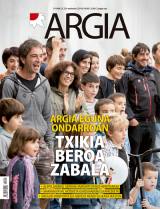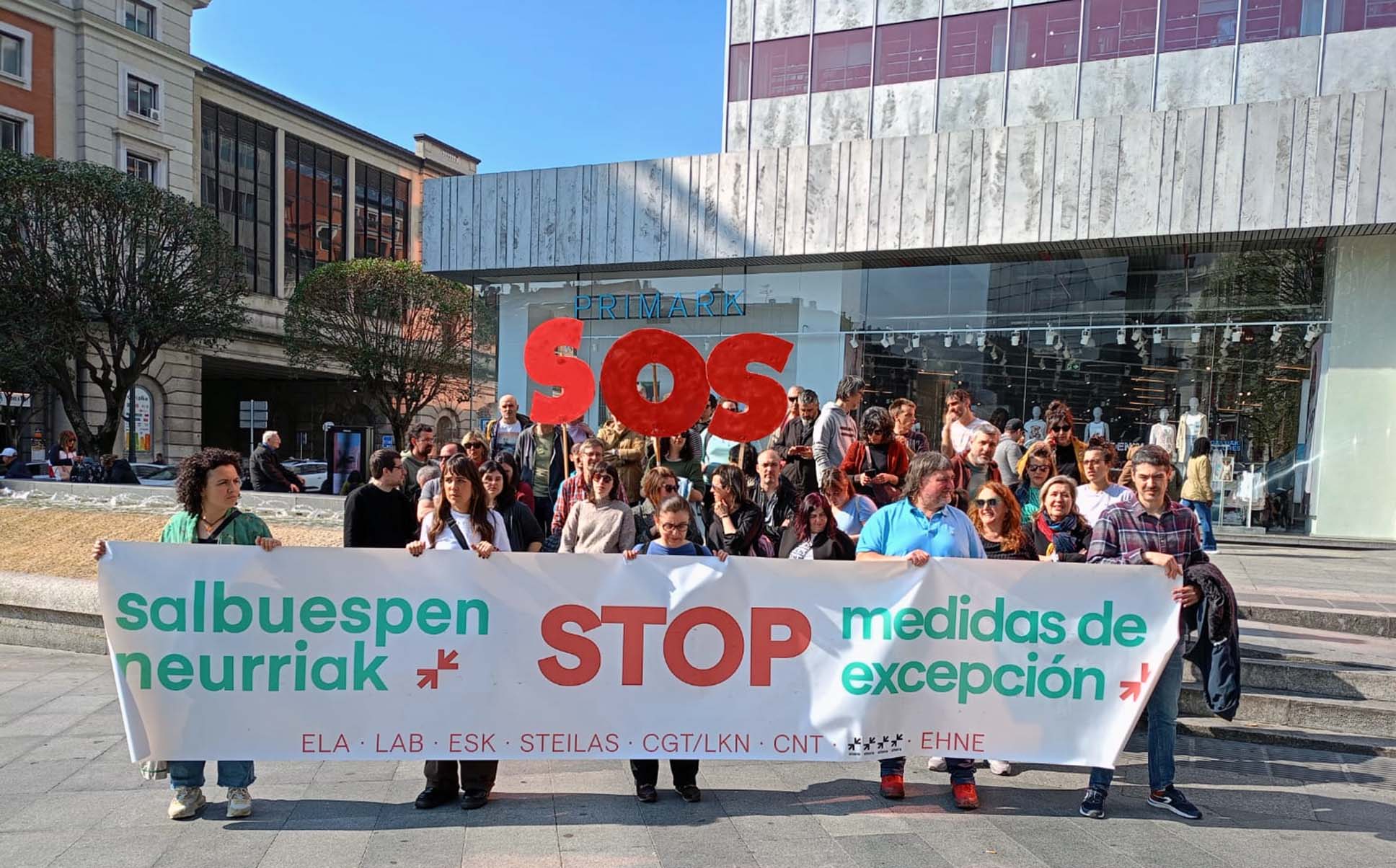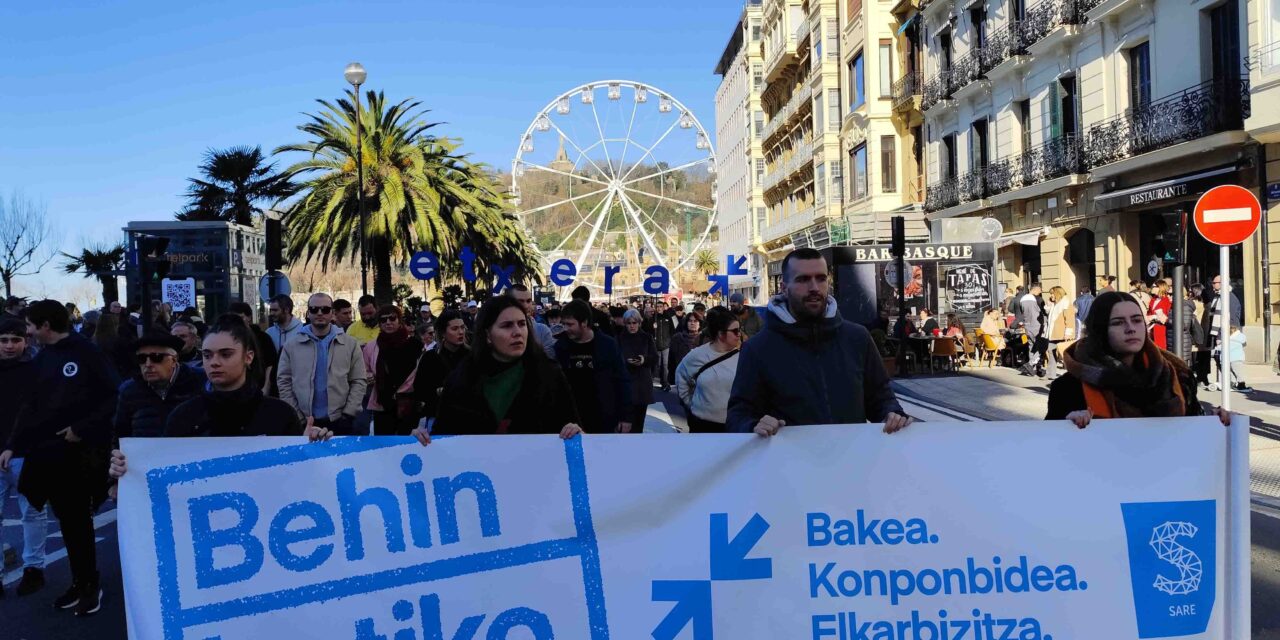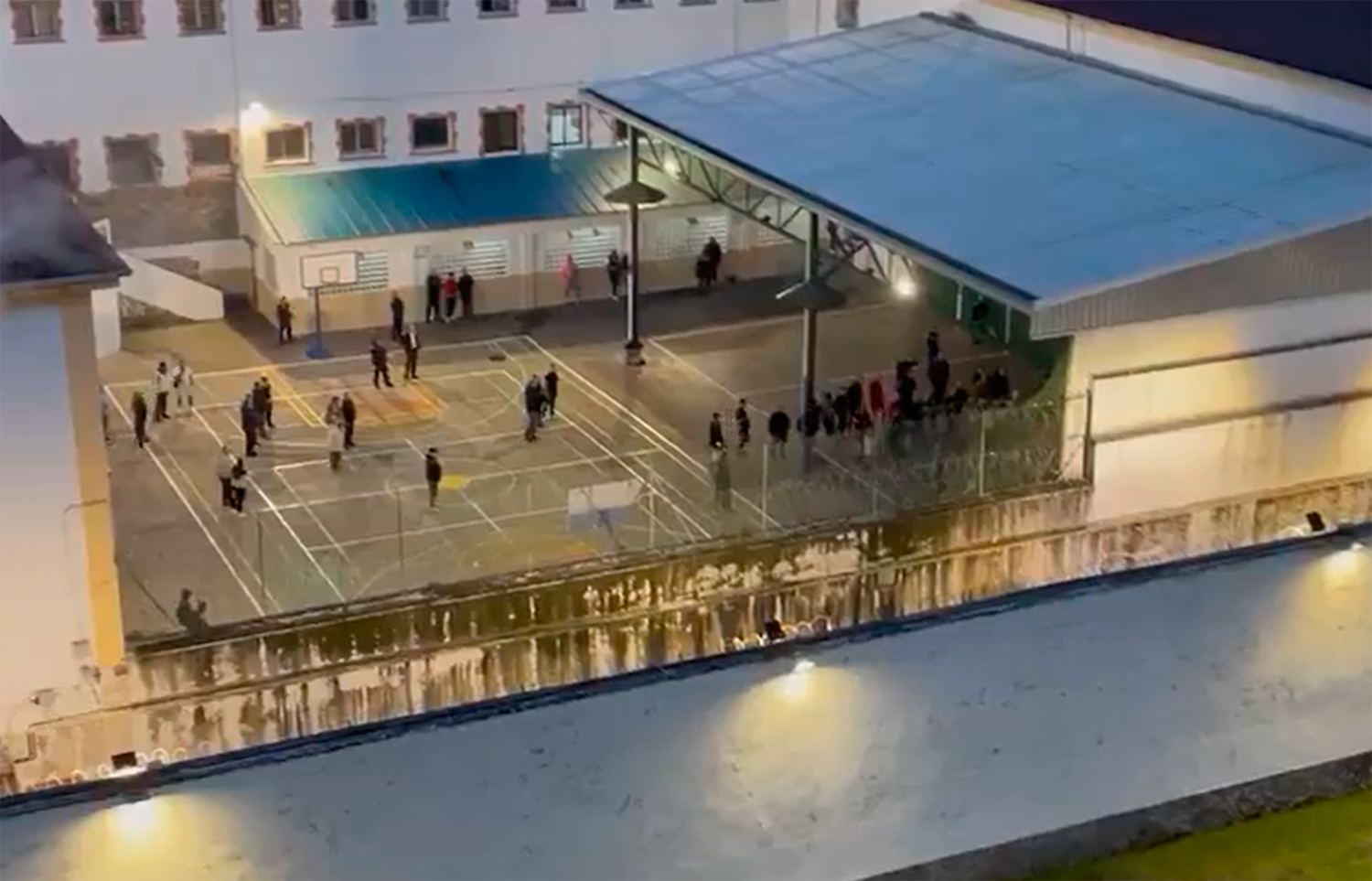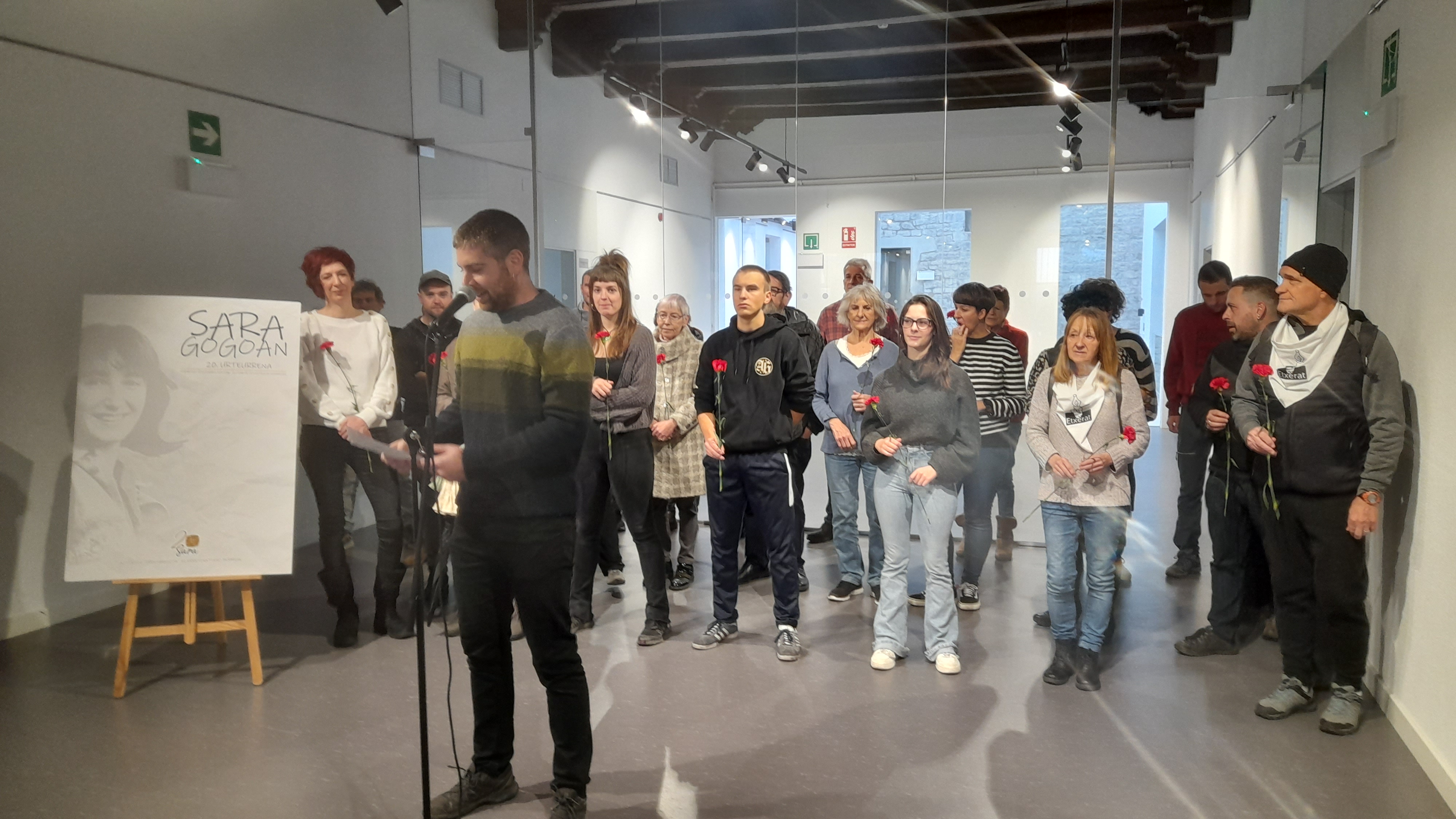"We realized that the Church was a pillar of Franco and decided to throw it away."
- 1968, a hot year in the Basque Country. The repression is brutal, the civil guard José Pardines and the dead Txabi Etxebarrieta, the dead Meliton Manzanas… Meanwhile, the abate Alberto Gabikagojeaskoa premiered prison in Zamora.

Apaiz izana, Zamorako konkordatu kartzela estreinatu zuen 1968an. Hilabete eta erdiko egonaldia eta gero libre irten, baina bertan zen berriro 1969an, eta hantxe eduki zuten 1976 arte, Franco hil ondoko urtera arte. Harrezkero hamabi urtez AEK-ko Didaktika Taldeko kide eta euskara irakasle izana, hainbat lan ekarri ditu euskarara. Tartean dira Charles Darwinen Espezieen jatorria, Eric Fromen Askatasunetik iheska eta George Santayanaren Edertasun-sena. Herri mugimenduetan parte hartuz ari da beti.
I was young to go to the priestly seminary.
10 to 11 years. I, for example, was taken to Saturraran. I was Biscayan, but most of them were Gipuzkoans. I was there five years, two years in Vitoria-Gasteiz and five more in Derio. Our family was very believer, my mother, and I tended to idealism, especially through religion. For his part, Franco was in power, his regime, and the repression was also enormous. Everything was counted in a rather confidential tone. We were children, but we knew that a woman from the village was called Snow, that she had been given castor oil and that her hair had been cut down on the street. In school, we sang Face to the Sun, but in our own way. “Impassible the demeanor,” for example, we sang “impossible the German.” We didn't know what was impassive or demeanor!
What about Saturraran?
Life wasn't a lockdown, it was different pavilions and we had to move from one place to another. We were outside, on a beach, in the football we were doing there, we had the opportunity to know different kinds of Basque… The nostalgia of the Gipuzkoans was of bread for us. Its two walls, our two walls. Among professors, Andoni Basterretxea, Emiliano Iturraran or Andoni Basterretxea were a great Euskaltzale.
Saturraran, Vitoria-Gasteiz, Derio.
The narrowest one was in Vitoria, the one that looked the most like the convent. In Derio, at the time of the bishop of Bizkaia [Casimiro] Morcillo, some professors arrived from Madrid and were more open than those here. They played with us freely. I was ordained a priest in 1960 and sent to the parish of Ajuria. I was there until 1969, except for those who were in jail. In Ajuria, my job was to be united with the people and also to organize Herri Gaztedi, for example.
Why Herri Gaztedi?
Because it was a good way to Christianize people, we were going from humanity to Christianity, with the youngest and not the youngest. Leisure activities were carried out and then reflected upon them. On one occasion, Herri Gaztedi organized a festival in Ajuria, in which more than 60 police officers approached the town to see what that was. The civil guards were known, but at the time the Grays arrived. The farmers were scared, and so were we. Ajuria, Iurreta, Durango, Gernika, Areatza, Derio… In some towns of Bizkaia and Gipuzkoa there was some group of Herri Gaztedi.
What happens between priests in the early 1960s? For example, a priest of Meñika, Patxi Bilbao, denounces from the pulpit the incorporation of the Spanish flag into the church by mayors and councilors. You report several cases of detention and torture in Ajuria, in Arenal.
Our names were the ones that appeared in the newspapers, but at that time we were many priests fighting. For example, the communiqué of the 339 Abades was issued in 1960, sent to the bishops of the Basque Country and provoked the indignation of Franco and the Spanish newspapers. They took it out in May, and I did it in June. That's why I'm not among the signatories, because only those who were cures signed. There was already a huge movement of priests.
Movement of cures…
But it wasn't just the priestly movement. No Dok Amairu was also there, and his enormous influence on the Abades and on citizenship. He left old songs that had been there until then and the protest songs spread. Julen Lekuona was also abbot, and Ez Dok of Amairu, and there's the song of the retaliated priest, like a murderer. That was the environment, and Herri Gaztedi, JOC [Christian Workers' Youth], HOAC [Workers' Brotherhood of Catholic Action]… began to claim the rights of the people. This also greatly influenced the priests.
In 1964, several young people revolutionized the Arenal school; painted and everything else. Then came the arrests made by the Civil Guard. You, at Sunday Mass, denounced from the pulpit the beatings and ill-treatment received by the detainees.
It was the first November of 64, I made sermon in Ajuria and Ibarruri. Hence came persecution against me. I was prosecuted by the Public Order Tribunal on the pretext of illegal propaganda. A sermon of mine, illegal propaganda! The sermon spread. Someone asked me, and I gave it to him, in Basque. Then they translated it and spread around the world, in Spanish, through Enbata, EGI and many more people. When we made the book of Zamora, I took the text in Spanish and brought it back to the Basque country, as I would have done in the Biscayan of that time.
In 1965 you were tried: you were sentenced to six months in prison and 25,000 pesetas in fine.
I was held in the convent of Trapa de Dueñas, in the first month and a half. But it was the year of Santiago and I was halved. The priests were serving their sentence in the convent, the prison of Zamora was not in the intentions of the Church or Franco. But Dueñas was coming a lot of people to see me. They came to see me because they couldn't get anywhere else. But I didn't want to be in the convent, priest or not, I was Franco's political prisoner, the church didn't need privileges, I wanted it to be in jail. One day police officers came to take me to Zamora's prison. I was happy, but I told them through the monks to bring me the bishop's signature and I hid in the convent. Policemen outside, hiding inside the convent, until I got to jail. I spent two days hiding, until I saw the notary with the bishop's credential, with permission to be taken to jail. Thus, he wanted the bishop to appear breaking the agreement for the interests of the authorities.
Because I needed the approval of the ecclesiastical authorities for the Abades to enter prison.
We became priests with a great idealism, they introduced us to be with the people. Then, when we were priests, we realized that the Church was one of the most important pillars of Franco, that we were that column, and we decided that we were going to throw it out. The Church was the main tool to deceive the people and we worked to make them aware of it.
You were in Zamora in 1968.
I spent a month and a half in Dueñas, part of June and almost every July. Since then I was in Zamora until 8 September. I went out with Amuriza, the first time he was introduced with a one-month fine.
On 7 June of the same year, ETA member Etxebarrieta killed Pardines civil guard and subsequently killed him by the civil guard. On 2 August, the head of the social-political brigade of Gipuzkoa, Meliton Manzanas, was killed.
I think we were already in Zamora three friends, Juan Mari Zulaika, Felipe Izagirre and I. They took me there, and the next day they brought the other two. One of them received a letter saying that an apple had fallen into his house. But they didn't have houses, nor apples. Thinking and thinking about what he meant, it was eventually invented that Apples had been killed.
In September they left Zamora and in November they went into lockdown at Derio's seminary.
We walked out of one and entered the other, almost without breathing. We were 70 Abades, Friars and Jesuits who entered Derio on November 4. We draw a letter claiming the Church in favor of the people. There we hold for about a month. Some priests had to flee, the repression was enormous, increasing, the prisoners received torture and harsh ill-treatment: Mario Onaindia, Jon Etxabe… and on May 30, 1969, we thought of running a lockdown on the bishopric.
The verse of Xabier Amuriza says who and who you were in the lockdown: “Bat Gabika, soon Kaltzada, after Naberan / Amuriza is fourth / No one is missing here / At the head of all / Nikola [Telleria] should be at the top.”
And the war council directly to Burgos. Zamora's is reported in the book [The Priestly Prison of Zamora, Txalaparta, 2011], but there we were until March 1, 1976. We went out to Nabera and I together. I spent seven years in Zamora. At the exit came family members to search for us, lawyer Danbo [Luis Mari Danborenea], the friends of the town… I come to Lekeitio, and the people waiting, but also the civil guards, street dresses, from bar to bar. Mola was then our street, because in the town the street Pulmonía, the port and the plaza is confused with a formidable air stream. We got to Lekeitio and they took me there. I got out of the car and I got the first hug, Henry's hug, the confectioner. The civil guard releases him, hits him in the face and throws him in the air. I walked into the house and saw my relatives at the door. The civil guards began to protest, wrapped in gloves, with the iron inside. They glued my brother and broke his cheek. My nephew saw it and fought with the civil guards. They took him to the barracks, though they left him free. I left Zamora in the midst of that battle. I didn't know what to think.
Since then, he worked for many years at AEK.
AEK's work was very interesting. I did everything and learned everything. At that time, the idea was that use would need it, that in a short time people would have to talk. It was a time of great generosity: we all gained the same, little, but equally, and without old age. That is what I would ask that, on the day of old age, those who were then very young counted the years of AEK. I worked with the Gernika group, most of them were women, people of a great category. It was a great pleasure. That is how we can work.
You've also worked hard on popular movements.
I've walked a lot everywhere. Lizarra-Garazi and others. I remember that in Gernika we met a lot of groups, political parties and others. But the PNV didn't come. We, however, welcomed the assembly and sent it the Minutes and invited it to come. And so, until they got there, they were really bad. Lizarra-Garazi was a missed opportunity. We did a great job in the village, it was a bottom-up movement, we worked seriously. If it had been OK, we would have had something else. It's 20 years. That of Tours Esku Dago is also a good job, it has come from the bottom to the top.
It's still you in the construction world.
Yes, in the popular movements, in the committee Gernika… The contribution has to be made by people of all ages, each in its own measure. At my age there is no possibility of contributing, without prominence, and without drawing attention, but to contribute with the speed of society. There's an excuse that you hear a lot. “The young people of now, effectively…”. I see without excuse the young people of now, the tried and the well-prepared, although there is also economic exile.
There you are, among young people and not so young.
Yes, I have always tried to do my bit, without leading, making use of movements, among young people and among people of all ages.
“Zamoran nengoela aita hil zitzaidan, eta Lekeitiora ekarri ninduten hiletara, guardia zibilek zainduta, eta haietako bati lotuta: nire ezker eskua haren eskumari lotuta. Herrikoak etortzen zitzaizkidan, eta elkar besarkatzen genuen, baina beso biekin nik, guardia zibilarena ere neurearekin batera hartuta, bion eskuak zauritu arte”.
“Klaustrofobia neukan, eta ez nuen tunel barruan lan egin. Handik ateratzen zen lurra non edo non bota behar izaten zen, eta huraxe izan zen nire lana. Egun hartan lurra kaxa batean sartu eta komuneko zulo jakin batetik botatzen ari nintzen, astiro-astiro. Zaintzaileak ere zaintzen genituen guk, eta han ari nintzen. Baina momentu batean ikusi nuen komunera zetorrela funtzionario bat. Komunak ez zeuden goitik eta behera guztiz itxita. Eta zer egiten du presoak komunean kaxa bete lur duela? Prakak jaisteko keinua egin nuen, eta funtzionarioak bira egin eta alde egin zuen. Eta eskerrak!”.
“Gasteizko apaiztegian nengoela dutxatuta nago ni kanpoan hamalau gradu zeropean egiten zuela. Bada, neguko dutxa hotza bezalakoa da kartzela: edo bertan geratzen zara, hilda, edo biziberritu egiten zaitu”.
“Saihestu egingo dira giza eskubideen, ordenamendu juridikoaren eta espetxeetako tratamendu psikosozialaren aurkako balioak eta jarrerak babestea, justifikatzea eta goratzea ekar dezaketen adierazpenak”, dio, besteak beste, agiriak. Azaroan Eusko Jaurlaritzako... [+]
Frantziako Poliziak 2002an atxilotu zuen zumarragarra, eta 30 urteko zigorra betetzen ari da. Sare Herritarrak mobilizazioa deitu du datorren ostiralerako, Urretxuko Potros Plazan.
I've thought if Palestinian children also have this question in their head with our book. How many duels are missing to end the genocide? How many children should Israel kill with the complicity of the states of the world.
Are you going to ask these questions to your mothers? Or... [+]









